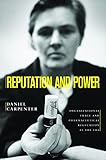Reputation and Power : Organizational Image and Pharmaceutical Regulation at the FDA / Daniel Carpenter.
Material type: TextSeries: Princeton Studies in American Politics: Historical, International, and Comparative Perspectives ; 137Publisher: Princeton, NJ : Princeton University Press, [2014]Copyright date: ©2010Edition: Course BookDescription: 1 online resource (856 p.) : 13 halftones. 17 line illus. 13 tablesContent type:
TextSeries: Princeton Studies in American Politics: Historical, International, and Comparative Perspectives ; 137Publisher: Princeton, NJ : Princeton University Press, [2014]Copyright date: ©2010Edition: Course BookDescription: 1 online resource (856 p.) : 13 halftones. 17 line illus. 13 tablesContent type: - 9780691141800
- 9781400835119
- 322.30973 362.17/82
- RA401.A3C37 2010
- online - DeGruyter
- Issued also in print.
| Item type | Current library | Call number | URL | Status | Notes | Barcode | |
|---|---|---|---|---|---|---|---|
 eBook
eBook
|
Biblioteca "Angelicum" Pont. Univ. S.Tommaso d'Aquino Nuvola online | online - DeGruyter (Browse shelf(Opens below)) | Online access | Not for loan (Accesso limitato) | Accesso per gli utenti autorizzati / Access for authorized users | (dgr)9781400835119 |
Browsing Biblioteca "Angelicum" Pont. Univ. S.Tommaso d'Aquino shelves, Shelving location: Nuvola online Close shelf browser (Hides shelf browser)

|

|

|

|

|

|

|
||
| online - DeGruyter Diaspora, Development, and Democracy : The Domestic Impact of International Migration from India / | online - DeGruyter Japan Transformed : Political Change and Economic Restructuring / | online - DeGruyter The Diffusion of Military Power : Causes and Consequences for International Politics / | online - DeGruyter Reputation and Power : Organizational Image and Pharmaceutical Regulation at the FDA / | online - DeGruyter Forbidden Fruit : Counterfactuals and International Relations / | online - DeGruyter Rational Theory of International Politics : The Logic of Competition and Cooperation / | online - DeGruyter Diversity and Complexity / |
Frontmatter -- Contents -- List of Illustrations -- List of Tables -- Acknowledgments -- List of Abbreviations and Acronyms -- Introduction. The Gatekeeper -- Chapter One. Reputation and Regulatory Power -- Part One: Organizational Empowerment and Challenge -- Chapter Two. Reputation and Gatekeeping Authority: The Federal Food, Drug and Cosmetic Act of 1938 and Its Aftermath -- Chapter Three. The Ambiguous Emergence of American Pharmaceutical Regulation, 1944-1961 -- Chapter Four. Reputation and Power Crystallized: Thalidomide, Frances Kelsey, and Phased Experiment, 1961-1966 -- Chapter Five. Reputation and Power Institutionalized: Scientific Networks, Congressional Hearings, and Judicial Affirmation, 1963-1986 -- Chapter Six. Reputation and Power Contested: Emboldened Audiences in Cancer and Aids, 1977-1992 -- Part Two: Pharmaceutical Regulation and Its Audiences -- Chapter Seven. Reputation and the Organizational Politics of New Drug Review -- Chapter Eight. The Governance of Research and Development: Gatekeeping Power, Conceptual Guidance, and Regulation by Satellite -- Chapter Nine. The Other Side of the Gate: Reputation, Power, and Post-Market Regulation -- Chapter Ten. The Détente of Firm and Regulator -- Chapter Eleven. American Pharmaceutical Regulation in International Context: Audiences, Comparisons, and Dependencies -- Chapter Twelve. Conclusion: A Reputation in Relief -- Primary Sources and Archival Collections -- Index
restricted access online access with authorization star
http://purl.org/coar/access_right/c_16ec
The U.S. Food and Drug Administration is the most powerful regulatory agency in the world. How did the FDA become so influential? And how exactly does it wield its extraordinary power? Reputation and Power traces the history of FDA regulation of pharmaceuticals, revealing how the agency's organizational reputation has been the primary source of its power, yet also one of its ultimate constraints. Daniel Carpenter describes how the FDA cultivated a reputation for competence and vigilance throughout the last century, and how this organizational image has enabled the agency to regulate an industry as powerful as American pharmaceuticals while resisting efforts to curb its own authority. Carpenter explains how the FDA's reputation and power have played out among committees in Congress, and with drug companies, advocacy groups, the media, research hospitals and universities, and governments in Europe and India. He shows how FDA regulatory power has influenced the way that business, medicine, and science are conducted in the United States and worldwide. Along the way, Carpenter offers new insights into the therapeutic revolution of the 1940s and 1950s; the 1980s AIDS crisis; the advent of oral contraceptives and cancer chemotherapy; the rise of antiregulatory conservatism; and the FDA's waning influence in drug regulation today. Reputation and Power demonstrates how reputation shapes the power and behavior of government agencies, and sheds new light on how that power is used and contested.Some images inside the book are unavailable due to digital copyright restrictions.
Issued also in print.
Mode of access: Internet via World Wide Web.
In English.
Description based on online resource; title from PDF title page (publisher's Web site, viewed 24. Aug 2021)


